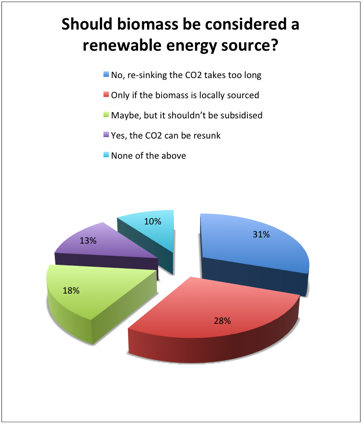Last week’s poll proved inconclusive overall, with a wide spread of opinion and close results. Of the 577 readers responding to the poll, the largest group, 30 per cent, thought that the CO2 emitted from burning biomass took so long to be sunk back into new forestry growth that it could not be properly considered a renewable resource. But an only slightly smaller group, 28 per cent (just 13 fewer people) thought that it could be considered renewable if it were sourced close to the location where it was burned.
The next largest group, 18 per cent of voters, thought that it was possible that biomass was renewable, but that it shouldn’t be subsidised, while 13 per cent were more positive, concluding that biomass is renewable. A further 10 per cent declined to pick an option.
The comments section also reflected this diversity of views, with several people noting that forestry is a well-established industry. “So what if it takes 50 or 60 years to regrow?” asked Richard Annett. “It's a short period in the scheme of things.” Another reader - Claire - argued that burning wood rather than much more energy-dense fossil fuels is a step backwards. “Tonne for tonne, much more wood is needed than coal to produce the same amount of energy. Given what a highly energy-demanding society we are, and that population and consumption are only growing worldwide, growing wood for energy will have a terrible impact on the world’s remaining forests.”
Robert Palgrave was also sceptical: “The carbon emitted to atmosphere by Drax warms the climate whether it has come from coal or biomass,” and pointed out that there is no requirement for power stations burning biomass to ensure that its emissions are balanced by regrowth. "Consequently there is no guarantee that biomass-originated carbon will ever be re-sequestered,” he added.






Collaboration to address viable solutions for VAWG database
Interesting to see what the funders say too..."The Innovation Launchpad Network+, .... brings together leading universities, the Catapult Network and...